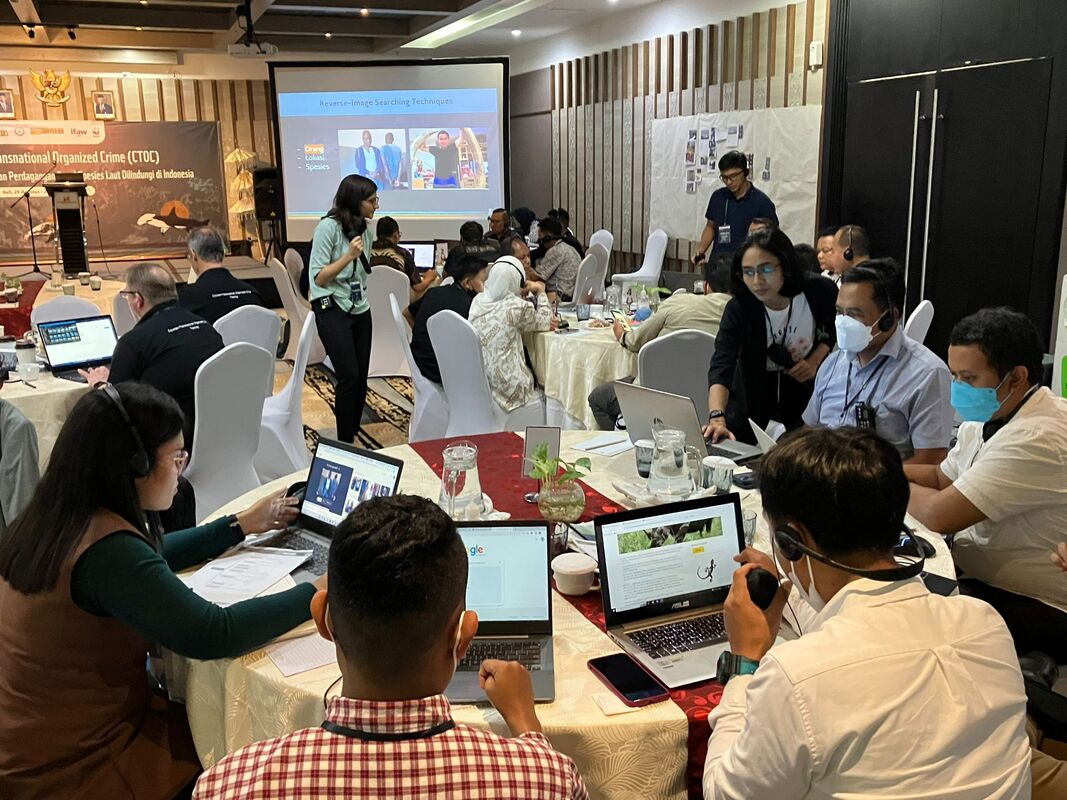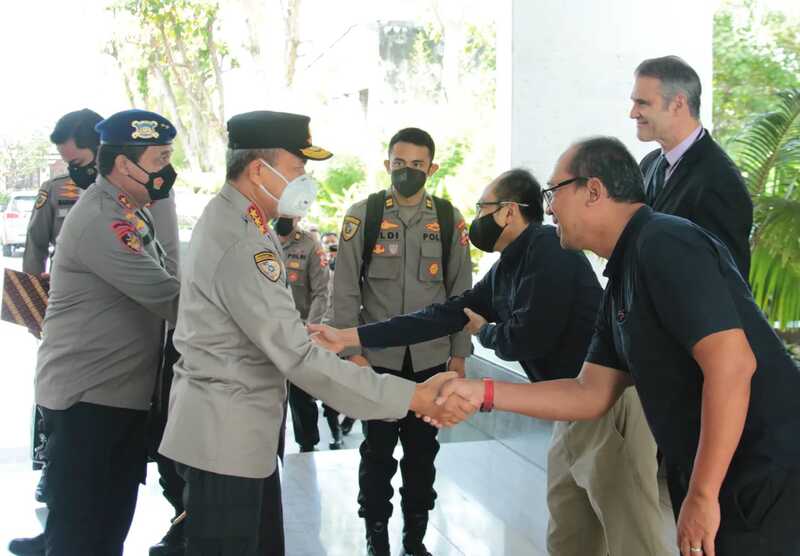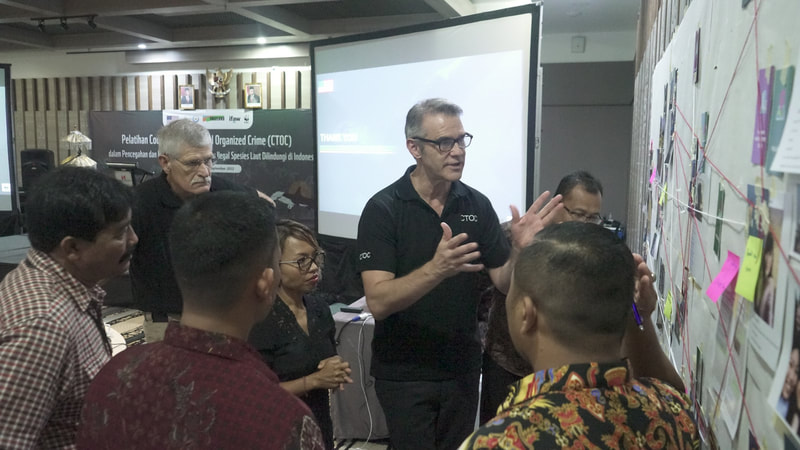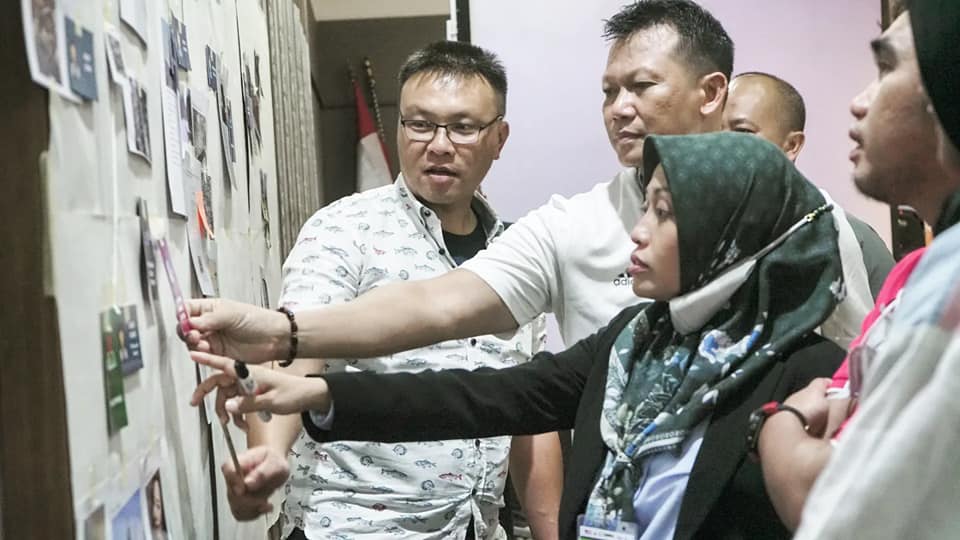|
(Denpasar, 4th September 2022) – In response to ongoing criminal exploitation of Indonesia’s marine wildlife, this week agencies from across the country convened for a specialized joint training by Freeland to find and dismantle the organized criminal rings behind the poaching and trafficking that is causing serious harm to many species, like sea turtles, sharks, as well as critically important ecosystems.
Last year, over 11,000 recorded cases of illegal wildlife trade were pursued by Indonesian law enforcers. Data on this illicit trade suggests that organized criminal networks are behind it, and that the trade and the networks are transnational, with links to other countries in Asia and nearly every other continent. Conservation and law enforcement agencies are sounding the alarm bell that this illegal trade, if left unaddressed, will cause irreparable damage to Indonesia’s marine and terrestrial ecosystems, on which millions of people depend. In response, Indonesia’s National Police Security Maintenance Agency (Baharkam) in collaboration with the Directorate General of Marine and Fishery Resources Supervision (PSDKP-KKP) and WWF Indonesia Foundation, requested and helped organize the specialist “C-TOC” (Counter Transnational Organized Crime) training course, developed by the international counter-trafficking organization - Freeland. Delivered by Freeland, C-TOC helps law enforcers illuminate and dismantle underground criminal networks that are currently making billions of US dollars in profits around the world from the illegal exploitation of wildlife. C-TOC focuses on trafficking networks as commercial supply chains. Highlighting the challenge during the opening of C-TOC in Bali on August 29, Head of Security Maintenance Agency, Headquarter of Indonesia National Police, Commissioner General (Komjen) Pol. Drs. Arief Sulistyanto, M.Si said “This exploitation is carried out on a massive, illegal, and organized basis to be trafficked across countries – this is an extraordinary crime. Of course, great skills, knowledge, commitment, and cooperation is needed to be able to enforce the rule of law for this nature conservation effort.” He added, “We must be courageous enough to say no to various forms of violations and irregularities, because crimes in this field are economically very profitable. Do not allow us, who are given the power to fight crime, be controlled by criminals. We must uphold the rule of law to preserve nature and not let crime be more sovereign than the law itself.” Dr. Imam Musthofa, as the Head of the Marine and Fisheries Program of WWF Indonesia said, "The high biodiversity that Indonesia faces threats, one of them rampant illegal marine protected species trade. This activity is our effort to support the Indonesian government to increase the capacity of the frontline guards to deal with illegal trade." C-TOC is designed to help participating agencies form task forces at the national and regional level to jointly destroy the criminal networks. This week’s training brought together personnel from Indonesian police, customs, financial intelligence units, tax inspectors, anti-corruption, prosecutors, judges, fisheries, and more. The course uses a realistic mock syndicate, while imparting skills on open source intelligence, digital forensics, handling confidential informants, and more. In anticipation of increased interdictions of wildlife, C-TOC courses are followed by another course, “Care for Confiscated Wildlife” that trains participants how to handle confiscated wild animals. Led by partner, IFAW, with support from WWF, the Care for Confiscated Wildlife course is being delivered to some of the same Indonesian agencies this coming week in Bali. C-TOC and Care for Confiscated Wildlife are part of a trilateral country project called “TRIPOD” (Targeting Regional Investigations for Policing Opportunities and Development) which is sponsored by the Bureau of International Narcotics and Law Enforcement Affairs, through US Embassy Jakarta-Indonesia. This project aims to curb trafficking of wildlife through marine pathways between Indonesia, Malaysia and the Philippines, through capacity building and networking support. C-TOC was delivered in Malaysia in June, and will be conducted in Philippines in early 2023. “Wildlife traffickers are unfortunately still on the winning side of this battle over nature’s future,” said Steven Galster, Founder of Freeland. “But C-TOC can put enforcers on the winning side by helping them identify the criminals behind the killing and trafficking, arrest and prosecute them, while finding and seizing their massive ill-gotten wealth. C-TOC leads to the formation of interagency and multi-national task forces, and with political will, can make government agencies more powerful than the criminal networks that are destroying our earth.” Freeland is a frontline counter-trafficking organization staffed by law enforcement, development and communications specialists in Asia, Africa and the Americas who build capacity, raise awareness, and promote good governance to protect vulnerable people, wildlife, and ecosystems from trafficking, corruption, and neglect. www.freeland.org The International Fund for Animal Welfare (IFAW) is a global non-profit helping animals and people thrive together. We are experts and everyday people, working across seas, oceans and in more than 40 countries around the world. We rescue, rehabilitate and release animals, and we restore and protect their natural habitats. The problems we’re up against are urgent and complicated. To solve them, we match fresh thinking with bold action. See how at ifaw.org WWF-Indonesia is part of the international conservation organization WWF that is working to sustain the natural world for the benefit of people and wildlife.. https://www.wwf.id/ For more information: ●Siti Yasmina Enita, Marine and Fisheries Communication Specialist | 0813-2773-2944 | [email protected] ●Karina Lestiarsi, Communication, Campaign & PR Team WWF-Indonesia | 0852-181-616-83 | [email protected] ●Freeland | [email protected]
0 Comments
Leave a Reply. |
Freeland
SIGN UP FOR FREELAND UPDATES and NEWSReceive monthly newsletters & periodical e-blasts sharing news from the frontlines on our efforts to ban the trade and trafficking of wildlife and humans.
|
© Friends of Freeland Foundation. All rights reserved. |




 RSS Feed
RSS Feed